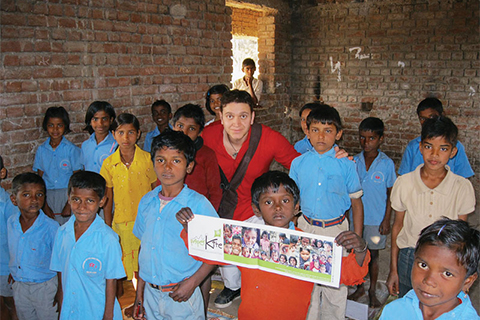Tarik Kadri (MSW 2012) had been studying yoga in India for a month in 2008, but he couldn’t calm his mind. He kept picturing the faces of the orphans he had seen in Bihar, in northeast India. The children, their feet bare and hair uncombed, didn’t have clean water, fresh produce or medical necessities. “It was the first time I felt compassion in a physical way,” he recalls.
Kadri, 33, was raised in a low-income, single-parent household in London, Ontario. “When I was a kid, there were people helping me at the food bank and the community centre,” says Kadri, who is a military social worker. “I always said, ‘When I grow up I’m going to beat this poverty.’” It was that sense of hope that he couldn’t find within the walls of those orphanages.
When he came home to Canada, Kadri founded the Paper Kite Children’s Foundation in 2009; the first branch was in Vancouver and others soon opened in Ottawa and Toronto. Paper Kite’s volunteers buy fruits and vegetables in Bihar to stimulate the local economy, and reduce water-borne diseases by educating caregivers about clean hygiene and working to improve existing water systems. They also provide school supplies, bedding and essential medical items. More than $22,000 in supplies have been purchased in the last two years. They’re still looking for help, through donations, volunteers and corporate sponsorships. Paper Kite’s work is particularly important in a region of India that has a 64 per cent literacy rate, and where more than half of all children are malnourished.
Kadri goes back to Bihar every year to check on the progress made and to purchase supplies there, instead of sending money. With Paper Kite’s help, two orphanages have expanded to accommodate more children in safer, cleaner conditions. “Our hope is that some of these kids will go on to college or university,” Kadri says. “We just want to provide opportunities that wouldn’t be there if we weren’t there.”
Recent Posts
U of T’s Feminist Sports Club Is Here to Bend the Rules
The group invites non-athletes to try their hand at games like dodgeball and basketball in a fun – and distinctly supportive – atmosphere
From Mental Health Studies to Michelin Guide
U of T Scarborough alum Ambica Jain’s unexpected path to restaurant success
A Blueprint for Global Prosperity
Researchers across U of T are banding together to help the United Nations meet its 17 sustainable development goals







2 Responses to “ The Kite Runner ”
Tarik Kadri studied yoga in India for a month but “couldn’t calm his mind.” I’d like to point out that a calm mind doesn't mean a blank mind. Yoga wakes us up to our purpose and focus in life, and, in Tarik’s case, it appears to have been successful in doing this.
I agree with Suwanda H.J. Sugunasiri letter in a recent issue that U of T Magazine should publish an article on Buddhist philosophy and psychology. Perhaps U of T researchers could design an experiment based on studies from adept and well-known masters, scientists, monks and yogis in this field instead of mainstream popular practitioners. When taken seriously and understood properly, Buddhist practices can help foster stable mental health among young people.
Abha Humeniuk
Midland, Ontario
Kudos to Tariq Kadri for his initiative.